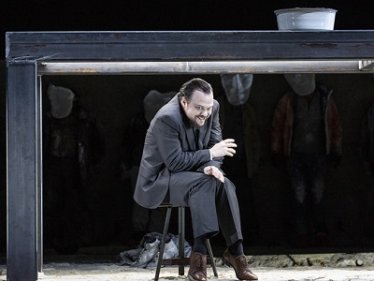Fidelio - Schedule, Program & Tickets
Fidelio
Opera in two acts
Libretto: Josef Sonnleithner, Stephan von Breuning and Georg Friedrich Treitschke after Jean-Nicolas Bouilly
First performance on May 23, 1814 in Vienna
Premiere at the Deutsche Oper Berlin on November 25, 2022
recommended from 13 years
approx. 2 hours 30 minutes / a break
In German with German and English surtitles
Introduction in the foyer on the right: 45 minutes before the start of the performance
To the piece
Composed in the spirit of the French Revolution, FIDELIO negotiates the question of individual and collective freedom in the face of tyrannical oppression. For the work on his only opera, Beethoven resorted to political material rooted in the tradition of the French rescue opera. It is the story of a death-defying woman, Leonore, who frees her husband, who has been imprisoned for political arbitrariness, and thus triggers a political upheaval. The fact that elements of German light opera, arias of romantic inwardness, orchestral interludes of tone poetic quality and a symphonic ending intersect in the opera in no way indicates Beethoven's musical inability to compose a coherent opera. Rather, the form takes into account his revolutionary idea of contrast dramaturgy and form explosion - the further Leonore descends into the depths of the dungeon, the more clearly the existential core of the drama emerges. The unconditional affirmation of freedom, human rights and humanism finally breaks ground in the symphonic, choral finale, in which Beethoven already hints at the future music of his "Ninth" with a quote from Schiller's "To Joy". In the course of its history of reception, the opera has repeatedly been politically appropriated by opposing camps, and Leonore has been stylized as an icon. And yet Beethoven's vision of a humanistic society, captured in music, outshines all subsequent attempts to reduce the work to unambiguousness.
To the staging
David Hermann, who worked at the Deutsche Oper e.g. impressed with his productions of such diverse works as THE GIRL WITH SULFUR WOODS, ORESTEIA and THE MAKROPULOS THING, took on Beethoven's masterpiece with stage and costume designer Johannes Schütz. Thinking about inside and outside, freedom and imprisonment, power and powerlessness is at the center of their questioning. For FIDELIO they have created a stage space that translates into poetic images the manipulation mechanisms and prison hierarchies so vividly described by Beethoven and his librettists. With his sensitive psychological guidance, David Hermann shows the deformations, the suffering and the dangerous instability of the characters who are part of this unleashed system - be it out of compulsion as inmates or "voluntarily" as guards or employees. Leonore also goes deep into this system, travels from brightness to darkness, while the pressure on all the characters involved increases immeasurably. Can freedom be fully won without new suffering arising from it?
Subject to change.
Libretto: Josef Sonnleithner, Stephan von Breuning and Georg Friedrich Treitschke after Jean-Nicolas Bouilly
First performance on May 23, 1814 in Vienna
Premiere at the Deutsche Oper Berlin on November 25, 2022
recommended from 13 years
approx. 2 hours 30 minutes / a break
In German with German and English surtitles
Introduction in the foyer on the right: 45 minutes before the start of the performance
To the piece
Composed in the spirit of the French Revolution, FIDELIO negotiates the question of individual and collective freedom in the face of tyrannical oppression. For the work on his only opera, Beethoven resorted to political material rooted in the tradition of the French rescue opera. It is the story of a death-defying woman, Leonore, who frees her husband, who has been imprisoned for political arbitrariness, and thus triggers a political upheaval. The fact that elements of German light opera, arias of romantic inwardness, orchestral interludes of tone poetic quality and a symphonic ending intersect in the opera in no way indicates Beethoven's musical inability to compose a coherent opera. Rather, the form takes into account his revolutionary idea of contrast dramaturgy and form explosion - the further Leonore descends into the depths of the dungeon, the more clearly the existential core of the drama emerges. The unconditional affirmation of freedom, human rights and humanism finally breaks ground in the symphonic, choral finale, in which Beethoven already hints at the future music of his "Ninth" with a quote from Schiller's "To Joy". In the course of its history of reception, the opera has repeatedly been politically appropriated by opposing camps, and Leonore has been stylized as an icon. And yet Beethoven's vision of a humanistic society, captured in music, outshines all subsequent attempts to reduce the work to unambiguousness.
To the staging
David Hermann, who worked at the Deutsche Oper e.g. impressed with his productions of such diverse works as THE GIRL WITH SULFUR WOODS, ORESTEIA and THE MAKROPULOS THING, took on Beethoven's masterpiece with stage and costume designer Johannes Schütz. Thinking about inside and outside, freedom and imprisonment, power and powerlessness is at the center of their questioning. For FIDELIO they have created a stage space that translates into poetic images the manipulation mechanisms and prison hierarchies so vividly described by Beethoven and his librettists. With his sensitive psychological guidance, David Hermann shows the deformations, the suffering and the dangerous instability of the characters who are part of this unleashed system - be it out of compulsion as inmates or "voluntarily" as guards or employees. Leonore also goes deep into this system, travels from brightness to darkness, while the pressure on all the characters involved increases immeasurably. Can freedom be fully won without new suffering arising from it?
Subject to change.
There are no products matching the selection.






